|
|
|
Sort Order |
|
|
|
Items / Page
|
|
|
|
|
|
|
| Srl | Item |
| 1 |
ID:
180355
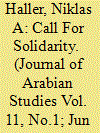

|
|
|
|
|
| Summary/Abstract |
While the contemporary political and economic ties between the Gulf region and the Levant are widely acknowledged, the deeper historical roots of this modern relationship are rarely recognized in light of persistent narratives of the Gulf’s relative isolation before the discovery of its hydrocarbon wealth. Building on a study of the British archival record, this article contributes to a challenge of such narratives by examining one of the earliest instances in which mutual ties became manifest: the political and financial support for the Arabs of Palestine by the population of the Trucial States (the contemporary United Arab Emirates) in the interwar years. As is shown, the development of pro-Palestinian sentiment was enabled not only by an earlier expansion of education in the Trucial States, but also by rapidly developing communication links between the Gulf and the wider Arab world. As a result of these developments, the population of the Trucial States was subject to –– and proved receptive to –– calls for Arab and Muslim solidarity emanating from Palestine in the late 1930s.
|
|
|
|
|
|
|
|
|
|
|
|
|
|
|
|
| 2 |
ID:
180310
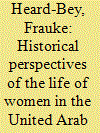

|
|
|
|
|
| Summary/Abstract |
This article provides an account of the way in which the lives of women have changed and developed in the Trucial States, and later the United Arab Emirates, over the last century. It describes changes in areas including the domestic sphere, family life, religion, relationships, travel, education, and employment. The object of this article is to understand the world of the predecessors of today's Emirati women and then to trace how and why aspects of that past – or ‘traditions’ of that world – were transported to still play a role in the lives of women of the UAE today.
|
|
|
|
|
|
|
|
|
|
|
|
|
|
|
|
| 3 |
ID:
174207
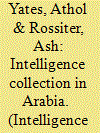

|
|
|
|
|
| Summary/Abstract |
Imperial powers, facing considerable information challenges in far-flung territories, adapted intelligence practices and machinery to fit local conditions. In contrast to the attention placed on British intelligence activities in territories considered within the ‘formal empire’ (i.e. where Britain was in direct control), we know very little about intelligence arrangements in ‘informal empire,’ where external powers exerted influence and protected their interests by working through local elites. Exploiting declassified documents and drawing upon interviews with retired intelligence officials, this article reveals Britain’s unique intelligence system in a remote corner of empire – the Trucial States (today’s United Arab Emirates) – which was built around a group of roaming officers tasked with collecting full-spectrum intelligence.
|
|
|
|
|
|
|
|
|
|
|
|
|
|
|
|
| 4 |
ID:
188340
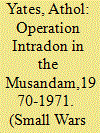

|
|
|
|
|
| Summary/Abstract |
This article examines Operation Intradon, a covert British counter-insurgency operation in the northern Omani enclave of Musandam. The operation, which ran from December 1970 to March 1971, was driven by the political aim of forcing the Sultan of Oman to take administrative control of this ungoverned enclave. This would then provide protection to the Strait of Hormuz oil route and remove a threat to the process of federating British protected states into what became the United Arab Emirates. We conclude by identifying what the operation says about how British military operations were crafted in Britain’s informal empire in the Gulf.
|
|
|
|
|
|
|
|
|
|
|
|
|
|
|
|
| 5 |
ID:
164400
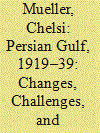

|
|
|
|
|
| Summary/Abstract |
The interwar period (1919–39) was a formative period in the Persian Gulf. These years marked a transition from a Gulf society once characterized by symbiosis and interdependency to a sub-region characterized by national divisions, sectarian suspicions, rivalries and political tension. This period witnessed a surge of anti-colonial and nationalist feeling in Iran, the rise of a stridently nationalist military leader in the person of Reza Shah Pahlavi, his implementation of an assertive Persian Gulf policy and his re-assertion of Iran’s claims to coastal territories ruled by Arab shaykhs under British protection. The challenge posed by ascendant Iran to Britain’s dominant position in the Persian Gulf generated an abrupt shift from indirect to direct forms of colonial penetration in the Gulf Arab shaykhdoms and a transfer of Britain’s locus of power from the Iranian to the Arabian littoral. This article surveys the wide-ranging political, economic and social processes that transformed the Persian Gulf community into a sub-region of Arab-Iranian rivalry during the interwar period.
|
|
|
|
|
|
|
|
|
|
|
|
|
|
|
|
| 6 |
ID:
177280
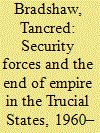

|
|
|
|
|
| Summary/Abstract |
One of the notable characteristics of Britain’s imperial role in the Trucial States (United Arab Emirates from 1971) was the establishment of armed forces and security services. The Trucial Oman Scouts (TOS) were the most important proto army in the sheikhdoms. During the last decade of the pax Britannica in the Trucial States competing units were also established in the region. The Foreign Office also sought to counter the potential threat of opposition groups inspired by several models of Arab nationalism by developing the internal security forces of the sheikhdoms. The establishment of these military organisations was attractive because they were much cheaper than deploying British forces. In January 1968 the Labour government decided to withdraw from East of Suez. The armies of the Trucial States formed the basis of the UAE armed forces, and British played a central role in creating the security state in the Emirates.
|
|
|
|
|
|
|
|
|
|
|
|
|
|
|
|
| 7 |
ID:
180303
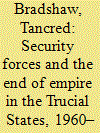

|
|
|
|
|
| Summary/Abstract |
One of the notable characteristics of Britain’s imperial role in the Trucial States (United Arab Emirates from 1971) was the establishment of armed forces and security services. The Trucial Oman Scouts (TOS) were the most important proto army in the sheikhdoms. During the last decade of the pax Britannica in the Trucial States competing units were also established in the region. The Foreign Office also sought to counter the potential threat of opposition groups inspired by several models of Arab nationalism by developing the internal security forces of the sheikhdoms. The establishment of these military organisations was attractive because they were much cheaper than deploying British forces. In January 1968 the Labour government decided to withdraw from East of Suez. The armies of the Trucial States formed the basis of the UAE armed forces, and British played a central role in creating the security state in the Emirates.
|
|
|
|
|
|
|
|
|
|
|
|
|
|
|
|
| 8 |
ID:
164401
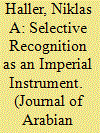

|
|
|
|
|
| Summary/Abstract |
Pursuing political objectives, Western imperial powers were selective in the inclusion of non-European polities into the realm of sovereign states. In the case of the Trucial States –– the contemporary United Arab Emirates –– Britain as the imperial power granted recognition to a regularly changing number of local shaykhdoms through the negotiation and repeated exchange of treaties, with important repercussions for the later political and urban development of the country. This article examines Britain’s decision-making regarding these recognitions from 1820–1952. Building on British archival records, it argues that the final result of seven recognized sovereign emirates was only to a very limited degree a representation of the situation as it existed on the ground. Instead it was largely the outcome of a British policy of selective recognition, driven by the strategic rationale of obtaining accountable and coercible treaty partners, and by tactical considerations such as the exclusion of imperial competitors, the erection of bases, and the obtainment of oil concessions.
|
|
|
|
|
|
|
|
|
|
|
|
|
|
|
|
|
|
|
|
|